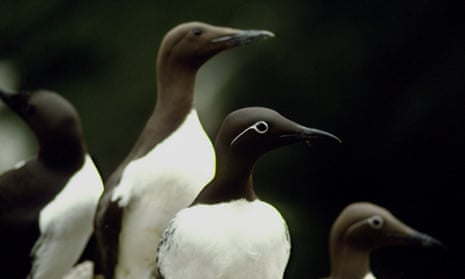“The whole crowdsourcing experience has been exhilarating,” says Tim Birkhead, professor of behavioural ecology at the University of Sheffield. “I want to say an enormous thank you to everyone who has donated to my guillemot monitoring research on Skomer,” he wrote last week in an update to his JustGiving page as he reached his crowd-funded target of £12,000. This is enough to keep the project going for one more year until a more stable source of funding can be found.
Birkhead began working on guillemots on Skomer in 1972, for his PhD. Every year since, he has been back to collect data from several breeding colonies on the island. But in 2013, the Countryside Council for Wales (which had been supporting the project) was taken over by Natural Resources Wales and funding was discontinued.
In February this year, winter storms made it difficult for guillemots and other seabirds to feed, resulting in the death of some 40,000 ocean-going birds. With the “seabird wreck” making the case for the guillemot study even more compelling, Birkhead wrote to NRW’s chief executive Emyr Roberts in March asking him once more to reconsider the decision to withdraw funding but says he has received no reply. “They should have taken responsibility, and reinstated the funding so the full impact of the wreck could have been evaluated.”

Birkhead organized a conference in Cardiff in April, with many of Britain’s top seabird researchers stressing the value of long-term studies like that on the guillemots of Skomer. An online petition raised wider awareness of the situation facing the University of Sheffield study.
But with NRW refusing to budge and with no option left, Birkhead turned to crowdfunding, setting up a JustGiving page to raise the £12,000 needed to maintain the study until a more secure source of funding can be found. With the Observer covering the story and Birkhead writing guest posts for Animal Magic, on the blog of the RSPB’s former conservation director Mark Avery and on IFLScience, the word began to spread and Birkhead reached the £12,000 target in just two weeks. “I have been overwhelmed by both the financial generosity shown and all the messages of support I have received,” he wrote in an update to the JustGiving site last week.
The publicity also triggered a response from NRW. “Natural Resources Wales continues to fund important monitoring for 12 species on Skomer as part of the UK-wide Seabird Monitoring Programme,” wrote Mike Evans, Head of Evidence, Knowledge and Advice for Natural Resources Wales towards the end of October. “Although it is not as detailed as the work by Sheffield University, it provides us with the information we need to properly protect the reserve.”
Birkhead questions this. The ongoing monitoring measures only breeding success and not survival, he says. “Moreover, I presented a report several years ago [in 2010] showing that their monitoring of guillemot breeding success was flawed and generated erroneous and misleading results,” he says. “They know this, so to say that it ‘provides us with the information we need to properly protect the reserve’ is disingenuous.”
The NRW has just released a position statement on its website pointing out that “tighter finances across the public sector” means making “difficult decisions at times, which won’t be universally popular.” The text commends Birkhead’s crowd-funding campaign as “a great example of alternative thinking.”
But, says Birkhead, “crowd-sourcing isn’t an alternative.” The most important outcome of this adventure, he says, is that it has raised awareness of the immense value of long-term studies and the question of who should fund them. “It is a way to make official bodies recognise their moral responsibilities. I’m delighted to have secured funding that will enable me to continue the work, but I hope it helps all long-term studies.”

Comments (…)
Sign in or create your Guardian account to join the discussion